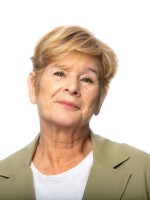Hampton resident Linda Janet Holmes studies alternative birthing methods and the Black women behind them. Her new book, Safe in a Midwife's Hands: Birthing Traditions from Africa to the American South, explores those practices and their resurgence.
Holmes’ research comes at a time when Centers for Disease Control and Prevention reports that Black women are three times more likely to die from a pregnancy-related cause than White women.
VPM Morning Edition Host Phil Liles recently spoke to Holmes about her book. Here’s an excerpt from that conversation.
Note: This excerpt has been lightly edited for length and clarity.
Phil Liles: Linda, what was the reason? And why was it so important to write this book?
Linda Janet Holmes: I think that it really goes back to my own childbirth experience, you know, four decades ago, which is similar to what we're hearing now, for many women — particularly Black women — who are experiencing health disparities.
I had some real ideas about wanting to have a natural childbirth, minimal technological intervention, feeling that I was empowered during my birth experience. But that's not what happened. That experience, in many ways, has shaped the rest of my life.
I ended up working with nurse midwives at the medical school in New Jersey. And then I worked with the health department in New Jersey, working on health disparities. And I also had a fellowship from the National Endowment of the Humanities where I wanted to talk to women, midwives who actually guided childbirth in the way that I had hoped my childbirth experience would have been.
You traveled to the African continent and spoke with midwives about their traditions?
Yes, I went to Alabama in 1981 to interview a last generation of traditional African American midwives, who essentially were continuing the practices of their mothers, their grandmothers and their great-grandmothers; some of whom were enslaved.
Being spiritual, not using any medicine other than maybe some teas, keeping the mother active during labor, using alternative birthing positions. A lot of times they were criticized for not using the medical model of care. I became really curious about what the health department and what doctors were calling superstition, being backwards, being untrained.
I sensed that there was more to it than that. I worked with a nurse midwife whose name was Peg Marshall. She was working in Ghana, and I was sharing with her some of these rituals. And she said, "Oh my goodness, that sounds like a naming ceremony that I saw traditional midwives using in Ghana."
And that's what began my reading and my explorations. Because I believed in my heart that somehow these Black women — despite enslavement, despite the Middle Passage — have managed to continue these practices.
Why do you think that some women today prefer a midwife to a hospital setting?
More recently, there have been medical studies and scientific studies that document the wisdom of these practices. I mean, the mother needs to be in the most relaxed state possible to have the best, healthy outcome for both her own physical health and for her baby's health.
And I think about how now we have to kind of go into the birthing space like warriors, you know — making our demands and then getting defeated. You want to be comforted. You don't want to be having to be on a march or something for human rights or birthing rights. That's not what you want to be doing in the birthing space.



